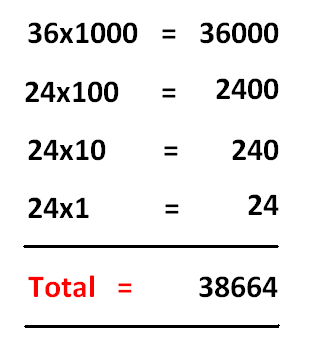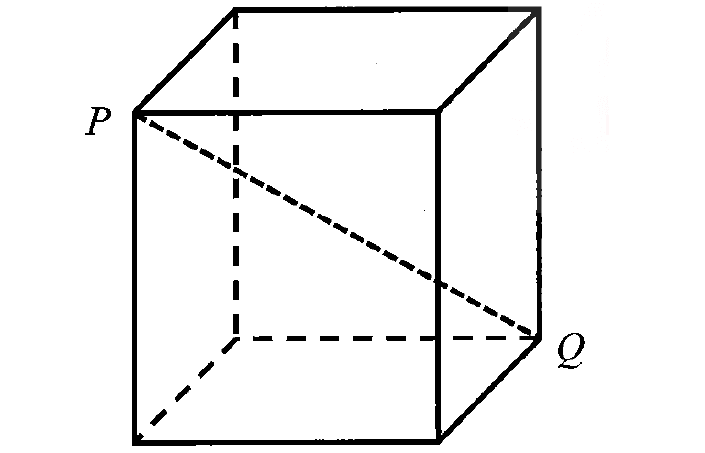SUM OF ALL 4 DIGIT NUMBERS FORMED USING 0 1 2 3 (without repetition)
List of Numbers Formed Using the Digits 0, 1, 2, 3
Since we are going to form four digit numbers, let us have four blanks.
____ ____ ____ ____
The first blank (thousand's place) has three options from the given four digits.
They are 1, 2, 3.
Because "0" can not be filled in the first blank.
If one of the three digits (1, 2, 3) is filled in the first blank, in total of four digits (0, 1, 2, 3), three digits will be remaining.
So, the second place has three options and it can be filled by one of the three digits.
After having filled the second blank, two digits will be remaining.
So, the third place has two options and it can be filled by one of the two digits.
After having filled the third blank, only one digit will be remaining.
So, the fourth blank has only one option and it can be filled by the remaining one digit.
The above explained stuff can be written as
3 x 3 x 2 x 1 = 18
Therefore the number of four digit numbers formed using 0, 1, 2, 3 is 18.
They are
1023
1032
1203
1230
1302
1320
2013
2031
2103
2130
2301
2310
3012
3021
3102
3120
3201
3210
Is it possible to write all the 18 numbers and find sum of them in exam as done above ?
Everyone's answer will be "no"
Then, is there any shortcut ?
Yes. To know the shortcut, come to know the value of "K" using the formula given below.

Here, students may have question.
That is, what do we do with "K" to find sum of all 4 digit numbers formed using the digits 0, 1, 2 and 3 ?
Answer is given below.
Concept - Value of "K"
What does "K" do if one of the digits is "zero"?
Answer :
1. Each one of the non-zero digits will come "K" times at the first place (thousand's place, if it is four digit number).
2. The digit "0" will come "K" times at the second place. The remaining blanks at the second place will be shared equally by the non-zero digits.
3. The same process which is explained above for the second
place will be applied for the third place and fourth place.
What does "K" do if none of the digits is "zero"?
Answer :
Each one of the non-zero digits will come "K" times at the first
place, second place, third place and fourth place.
How is the above concept applied in our problem ?
In our problem, we have
K = 18/3
K = 6
In the given four digits, one of the digits is "0".
Each one of three non-zero digits (1, 2, 3) will come at the thousand's place 6 ( = K ) times in the 18 numbers formed using 0, 1, 2, 3 (Please see the 18 numbers above).
And the digit "0" will come 6 ( = K ) times at the second place in the 18 numbers formed. The remaining 12 blanks of the second place will be shared equally by the non-zero digits (1, 2, 3). That is, each one of the digits (1, 2, 3) will come 4 times at the second place.
For the third place and fourth place, the same process which is explained above for the second place will be applied.
That is, "0" will come 6 ( = K ) times, each one of the digits (1, 2, 3) will come 4 times at third place and fourth place.
Sum of Numbers at the First, Second, Third and Fourth Places
To find sum of all 4 digit numbers formed using 0 1 2 3, we have to find the sum of all numbers at first, second, third and fourth places.
Let us find the sum of numbers at the first place (thousand's place).
In the 18 numbers formed, we have each one of the digits (1, 2, 3) six times at the first place.
Sum of the numbers at the first place (1000's place) :
= 6(1 + 2 + 3)
= 6 x 6
= 36
Let us find the sum of numbers at the second place (hundred's place).
In the 18 numbers formed, the digit "0" comes six times and each one of the digits (1, 2, 3) comes four times at the second place.
Sum of the numbers at the second place (100's place) :
= 6 x 0 + 4(1 + 2 + 3)
= 0 + 4 x 6
= 24
Since we have the same process of second place for third place and fourth place,
Sum of the numbers at the third place (10's place)
= 6 x 0 + 4(1 + 2 + 3)
= 0 + 4 x 6
= 24
Sum of the numbers at the fourth place (1's place)
= 6 x 0 + 4(1 + 2 + 3)
= 0 + 4 x 6
= 24
Sum of All 4 Digit Numbers Formed Using 0, 1, 2, 3 (without repetition)

Explanation for the Above Calculation :
36 is the sum of numbers at thousand's place. So 36 is multiplied 1000.
24 is the sum of numbers at hundred's place. So 24 is multiplied 100.
24 is the sum of numbers at ten's place. So 24 is multiplied 10.
24 is the sum of numbers at unit's place. So 24 is multiplied 1.
Note :
The method explained above is not only applicable to find the sum of all 4 digit numbers formed using 0 1 2 3. This same method can be applied to find sum of all 4 digit numbers formed using any four digits in which one of the digits is zero.
Kindly mail your feedback to v4formath@gmail.com
We always appreciate your feedback.
©All rights reserved. onlinemath4all.com
Recent Articles
-
Digital SAT Math Problems and Solutions (Part - 152)
Apr 28, 25 11:54 AM
Digital SAT Math Problems and Solutions (Part - 152) -
Digital SAT Math Problems and Solutions (Part - 151)
Apr 26, 25 11:18 AM
Digital SAT Math Problems and Solutions (Part - 151) -
AP Calculus BC Problems with Solutions
Apr 26, 25 05:49 AM
AP Calculus BC Problems with Solutions
